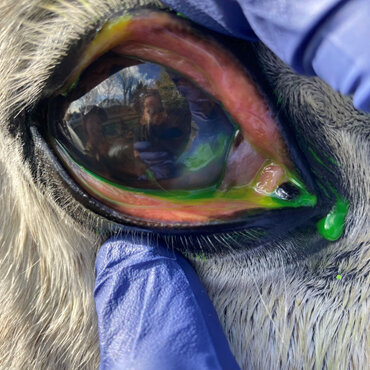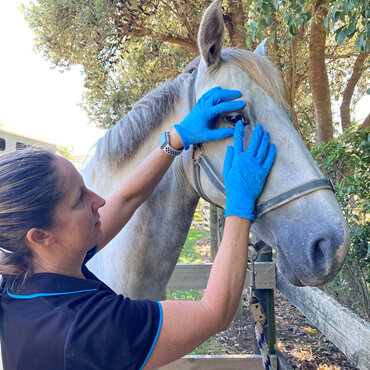Franklin Vets
Franklin Vets - excellence in veterinary care for dairy, farming, lifestyle, equine and household pets. BESTPRACTICE ACCREDITED NZ.
Your account is powered by Storbie. To edit your profile visit my.storbie.com
Your account is powered by Storbie. To edit your profile visit my.storbie.com

The easiest way to check if your horse is squinting is to look at it directly from the front and compare the angle of the upper eyelashes and see if one side is pointing downward more than the other. Horses with eye pain or issues are frequently still eating, drinking and moving around happily so many people are often tempted to monitor it for a few days before calling the vet, but you must treat it as an emergency as eye problems can go from being minor to serious very quickly.
Eye ulcers are one of the most common issues with horse eyes. A scratch on an eye might only need a few days of treatment if caught immediately, but this can quickly turn into a much deeper eye ulcer if left untreated. Deep or infected eye ulcers can be difficult and expensive to treat and can result in your horse losing an eye.
Uveitis is another commonly seen problem in horse eyes. Uveitis is inflammation in certain parts of the eye, and can be caused by trauma, or infection, or can be hereditary. Uveitis can recur and usually requires aggressive treatment. It can have many secondary complications within the eye and is the most common cause of blindness in horses.

Horses, especially appaloosas and ones with pink around their eyes, are also prone to a type of cancer called squamous cell carcinoma. Exposure to UV light is a predisposing factor to this and it can be helpful to get a fly mask with a UV rating as prevention. Early lesions can look like a bit of redness or thickening around the eyelids, or increased discharge from the eye.
Dr Melissa Sim DVM
Franklin Vets - excellence in veterinary care for dairy, farming, lifestyle, equine and household pets. BESTPRACTICE ACCREDITED NZ.



